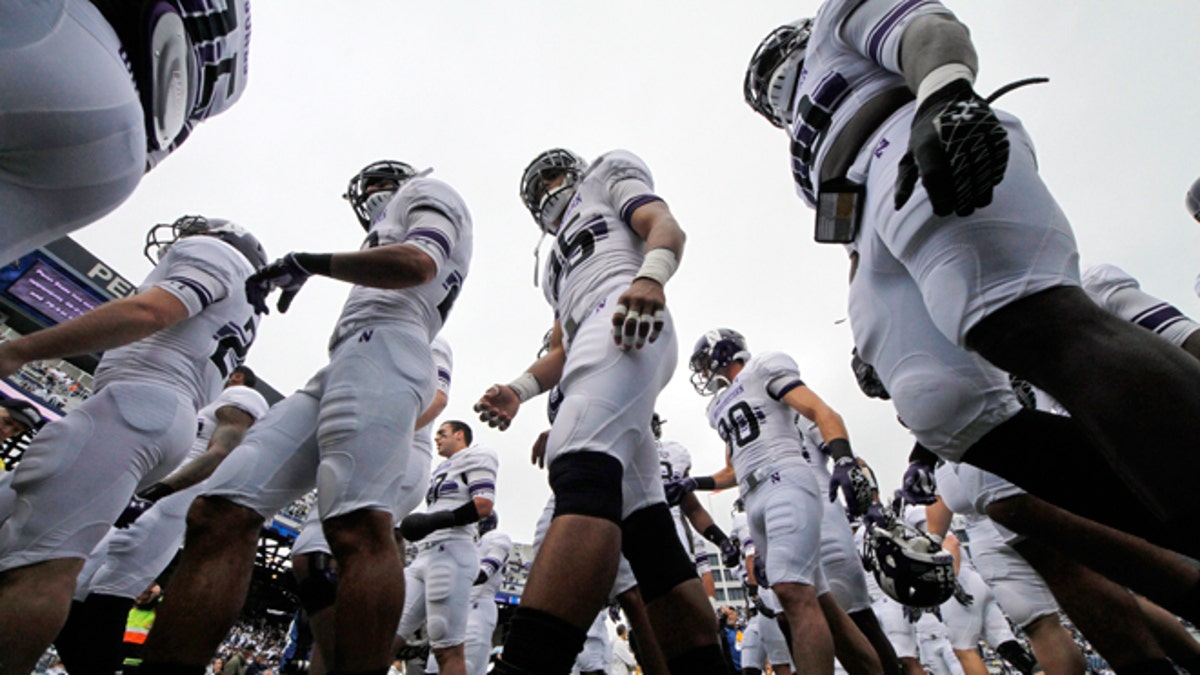
FILE - Oct 6, 2012: Tthe Northwestern football team heads to the locker room after warming up before an NCAA college football game against Penn State in State College, Pa. A ruling Wednesday, March 26, 2014, that the Northwestern football team can bargain with the school as employees represented by a union may not by itself change the way amateur sports operate. But it figures to put more pressure on the NCAA and the major conferences to give something back to the players to justify the billions of dollars the players bring in -- and never see. (AP Photo/Gene J. Puskar)
The National Labor Relations Board’s determination that Northwestern University football players are employees and may form a union, along with other lawsuits moving through the courts, has the potential to end the exploitation of young athletes by universities, coaches and fans.
The advent of cable television—and in particular ESPN—gave universities vast new opportunities to profit from football and basketball, and the large and most lucrative programs have consolidated into five major conferences.
Those dominate the Bowl Championship Series in football and the NCAA tournament in basketball, and earn mega-dollars in the process. For example, Northwestern football earned an $8 million profit on its $30 million in revenue during the 2012-13 season. That’s a significant amount of money for a school that hardly enjoys the status of perennial football powerhouses like Notre Dame or the University of Alabama.
[pullquote]
Universities monopolize the market through the NCAA, which mandates that the student are amateurs and can’t be paid salaries. This denies athletes the value they create in the marketplace through their labor and unique talents.
Instead, coaches earn millions, the universities take the profits to subsidize other activities, and the fans get cheap entertainment.
Universities contort admissions standards and faculty bend grades to deliver winners and appease alumni and other donors.
Universities use winning teams to raise funds but most of that money stays in athletic programs.
I know this first-hand, from hard experience running a major academic program – the money raised by sports teams preempts sources of support for educational activities.
In exchange for scholarships for tuition, room and board, and limited expenses, student athletes are expected to train year round and work 40 to 60 hours week during training camp and the regular season.
Their lives are very tightly controlled. The school determines when they can study, what social media activities they can participate in and more. Quite simply, athletes are often so tightly managed as to impair their development into fully-functioning adults.
Star athletes like Alabama quarterback A.J. McCarron, who delivered two national championships to his school, are simply worth millions more than the scholarships and other benefits they received and are flat out exploited.
Most athletes, unlike McCarron, will not enter a pro-league, but instead leave college after five years with a degree in a soft major. A major that has little value in today’s tough jobs market. Or they may leave school with no diploma at all. Many leave with medical conditions from overtraining and injuries but no financial assistance to pay for a lifetime of care.
The Northwestern football players are not necessarily seeking salaries as much as better terms—additional opportunities to complete degrees and extended health benefits. However, Title IX requires whatever additional benefits they obtain the university must extend to athletes in all other sports.
If upheld on appeal, the NLRB decision that the football players are employees will greatly aid plaintiffs in two pending antitrust suits—those seek to break NCAA rules that prohibit salaries and permit the universities to use player images and names in endorsements and promotions without compensation.
Those suits have the potential to do to college sports what free agency did to professional football, baseball and basketball, after the courts struck down owners’ monopoly practices similar to current NCAA rules.
The top 30 or 40 programs in each college sport will be able to pay top dollar to attract the best athletes, and the other universities will not be able to effectively compete.
Further complicating matters, Title IX requirements would require universities to pay female athletes, as group, an amount equal to what they pay men in football, basketball and other sports. It could soon be very profitable to be a woman golfer at the University of Maryland.
The solution may be to permit the top 30 or 40 major universities to form football and basketball teams “affiliated” with their institutions and a major pro-franchise, but require those be self-financing based on ticket sales, TV revenues and contributions from their professional team.
Pay the athletes, offer them the opportunity to earn a degree over five or even six years, but don’t require them to enroll if they are not capable or are simply disinclined.
By disengaging university sponsored athletics from academic programs the potential to corrupt admissions and faculty would be greatly reduced, and a broader range of gifted young athletes would have the opportunity to participate.
If this happened then all the other universities could have walk on programs for genuine amateurs, and those programs, in a manner similar to the Ivy League schools and military academies, could compete at a level that complements a decent university education.
After all, a quality education is why young people should go to college.








































